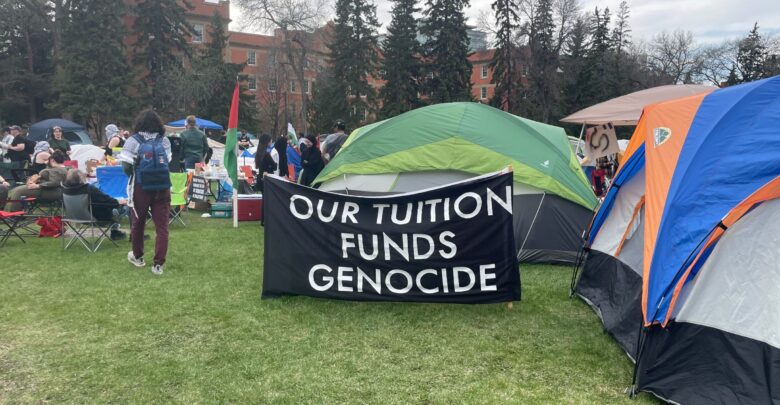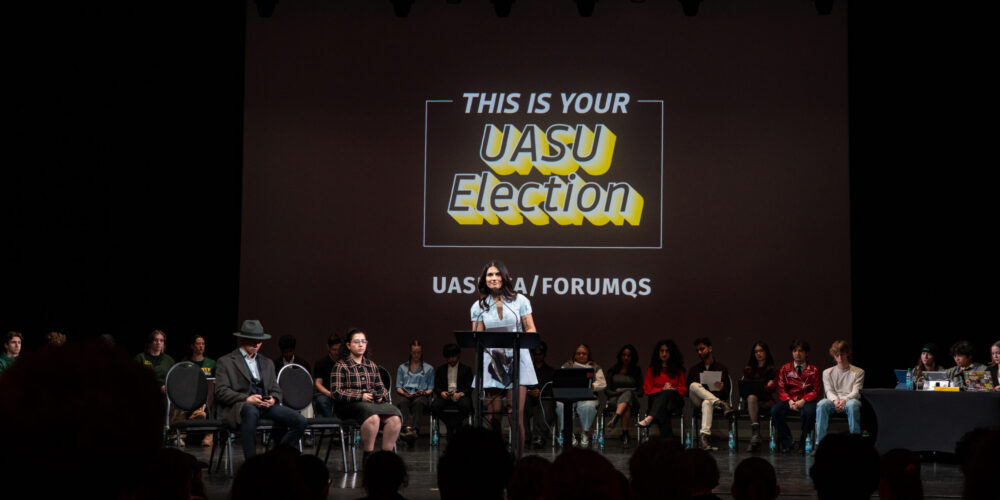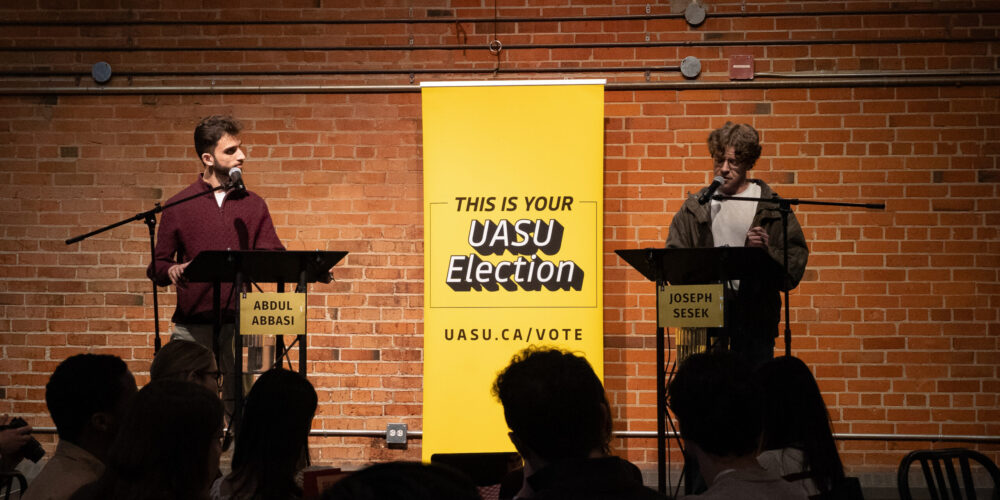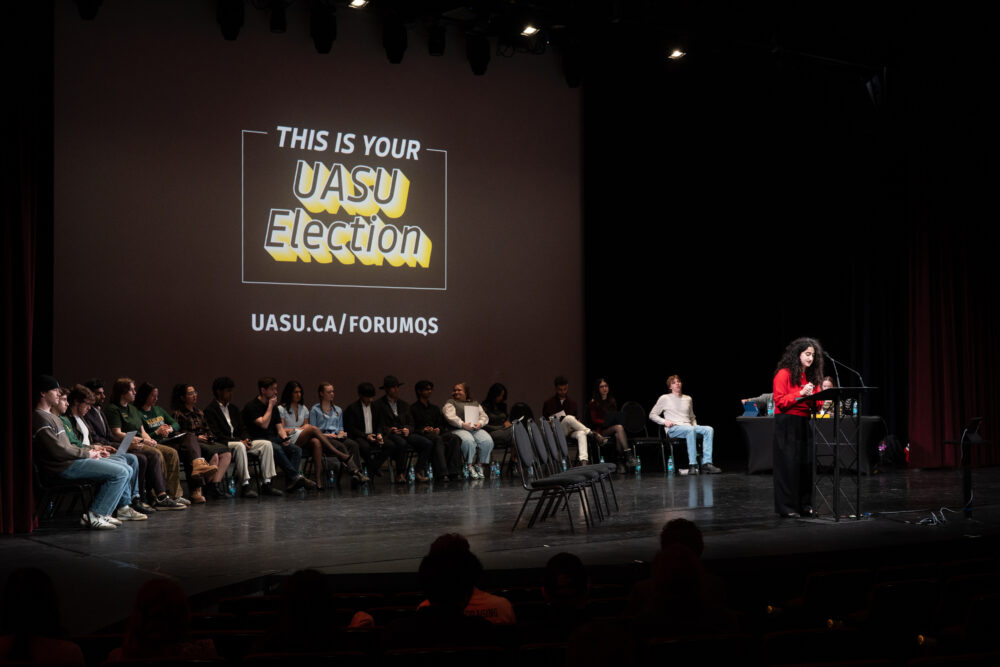Organizers address Flanagan’s defence of clearing Palestine solidarity encampment
People's University for Palestine YEG released a statement addressing Flanagan's statement about the encampment's clearing. Political science professor David Kahane says their response "was correct in every element, as far as I know."
 Lily Polenchuk
Lily PolenchukOn May 11, a Palestine solidarity encampment on the University of Alberta Main Quad that began on May 9 was taken down by Edmonton Police Services (EPS). Officers deployed non-lethal munitions on protestors and pushed them back to Saskatchewan Drive Northwest.
In a statement put out on May 12, U of A President and Vice-chancellor Bill Flanagan defended the decision to clear the encampment because of the “serious and potentially life-threatening risks associated with the encampment.”
People’s University for Palestine YEG, the group that organized the encampment, released a statement on May 12 in response to Flanagan’s statement. In it, they addressed the allegations made in Flanagan’s statement, as well as called for an immediate resignation of Flanagan.
David Kahane is a U of A professor in the department of political science and member of Independent Jewish Voices (IJV) Edmonton. Kahane told The Gateway that he participated in the encampment and was away from it for a total of six hours. He said that the statement from People’s University for Palestine YEG “was correct in every element, as far as I know.”
“Every moment and every day where Flanagan tries to evade responsibility damages the reputation of the university, increases harm toward the students, faculty, staff, and community members who have been harmed by the university’s actions, and betrays the core values of our institution,” Kahane said.
The Association of Academic Staff of the University of Alberta (AASUA), U of A Graduate Students’ Association (GSA), Non-Academic Staff Association (NASA), and U of A Students’ Union (UASU) presidents signed a joint letter to Flanagan, sent on May 13. The letter called for an emergency meeting with James Allen, the head of the U of A Safety and Security Committee, Flanagan, and Ravina Sanghera, the Dean of Students, about the encampment removal.
“While we have received the communication that you sent to all members of the campus community, we must note that we have also received numerous reports from members of our respective organizations that directly contradict many claims in your letter,” the letter read.
Potential weapons in Flanagan’s statement is “concocting something to excuse the inexcusable,” Kahane says
In his statement, Flanagan said that only 25 per cent of the encampment’s occupants were U of A students, and most occupants weren’t members of the U of A community.
According to Kahane, the encampment was led mainly by U of A students, but also MacEwan University students. Kahane added that many U of A faculty, staff, and alumni were occupants of the encampment. The People’s University for Palestine YEG’s statement said the university “is lowballing” the number of U of A community members that were participating.
“We want to reiterate that at no time during the encampment did Flanagan or any representative of the university administration come down to the camp to speak to student protestors,” the statement read.
According to Flanagan’s statement, the encampment was asked to remove the wood pallets it collected because they were a fire hazards. Flanagan said “17 wood pallets [were found] located within 150 meters of the encampment,” after asking for their removal. The statement also said that wood pallets “are known to be used to make barricades.”
Kahane said the pallets were collected to be put under tents in case of heavy rain, to prevent the bottoms of tents from soaking through. When the fire hazard was communicated to the encampment, Kahane said the pallets were carried to a nearby dumpster.
Additionally, Flanagan’s statement said that when the encampment was taken down, “potential weapons, including hammers, axes, and screwdrivers, along with a box of syringes” were found.
Kahane said he brought a hammer and mini sledgehammer to the encampment to put up banners on stakes and put pegs in the ground. Kahane added that the syringes were there because of “a really good community care initiative.”
“There was a first-aid tent being set up and a certified first-aid practitioner brought in some equipment,” Kahane said. “‘Potential weapons’ is concocting something to excuse the inexcusable.”
Flanagan’s statement read that because of the university’s “limited resources,” it had “no means to protect the encampment from escalating tensions and potential violence if there are counter-protesters.”
“The camp was 100 per cent peaceful. The camp itself was not dangerous,” Kahane said. “The camp had a lot of capacity to de-escalate and handle conflict itself. It was capable of keeping itself safe.”
Good leaders “step up, acknowledge the mistake” Kahane says
On May 11 during the clearing of the encampment, U of A Protective Services (UAPS) Threat Assessment Program and Investigations Manager, Frank Page, said “this group is officially banned, verbally, for a period of a year from the U of A campuses.” A video of the announcement was posted by IJV Edmonton.
A campus update posted on May 11 at 2:45 p.m., which aimed to correct “misinformation,” said that no one from the U of A community involved in the encampment was banned, and no students were suspended.
According to Kahane, the update leaves room for the ban to apply to non-members of the U of A community. He added that there are other disciplinary penalties other than suspension, and saying “no students were suspended does not say we will not suspend any students.”
The Gateway asked U of A media relations on May 11 for confirmation on if the ban does apply to non-members of the U of A community, and if other disciplinary penalties were given to members of the U of A community. The Gateway did not receive a response in time for publication.
“Good leaders — when the organization they lead has made a serious mistake — step up, acknowledge the mistake, and talk about how they will go forward as best as they can,” Kahane said. “Bad leaders shimmy and shuffle, and try to twist words so they can pretend nothing bad happened. That is not going to fly.”




